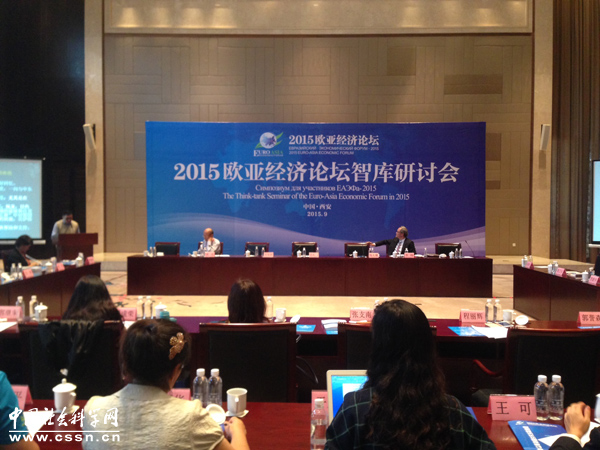Foundation laid for Eurasian dialogue mechanism

The Think Tank Seminar of the 2015 Euro-Asia Economic Forum takes place in Xi’an, Shaanxi province on Sept. 25.
At the second Think Tank Seminar of the 2015 Euro-Asia Economic Forum (EAEF) in Xi’an, Shaanxi Province on Sept. 25, about 50 scholars from China and other countries discussed the construction of economic think tanks throughout Europe and Asia.
The development report issued at the meeting includes research results that cover such fields as trade investment, interconnectivity, science and technology, tourism, and ecological progress in the Eurasian region along the proposed routes of “the Belt and Road” initiative.
Feng Zongxian, director of the EAEF Research Institute at Xi’an Jiaotong University, suggested a think tank network should be constructed along with “the Belt and Road.” “Think tank cooperation can facilitate policy communication and provide a platform for equal discussion while enhancing mutual understanding and trust,” he said. “Moreover, exchanges among think tanks can promote cultural exchanges, mitigate cultural differences and consolidate people-to-people connection.”
The Eurasian area has abundant resources and a vast market, creating great potential for regional cooperation. Dmitry Mezentsev, secretary-general of the Shanghai Cooperation Organization, told the Chinese Social Sciences Today that “the Belt and Road” initiative has made substantial progress toward stable economic growth, laying a foundation for development in the next decade.
Because it is a huge project that stretches over a vast area, “the Belt and Road” requires the participation of all nations along the routes, Mezentsev said. In the process, planners should emphasize the unique role think tanks play in coordinating development strategies among different nations, establishing a mechanism for policy communication, and building a community of shared interests, destiny and responsibility, he said.
With the advances made in the Asian Infrastructure Investment Bank, the Silk Road Fund as well as cooperative projects between China and other nations along the routes in railway and other infrastructure, “the Belt and Road” initiative presents a new opportunity for economic exchanges and cooperation between Europe and Asia.
Shi Ze, director of the International Energy Strategic Research Center at the China Institute of International Studies, recommended a normalized mechanism for dialogues and cooperative studies among think tanks.
“Such a mechanism is aimed at promoting exchanges and cooperation among think tanks in those nations along the routes, enhancing trust and clarifying doubts, and building consensus in order to offer policy support for the construction of ‘the Belt and Road,’” he said.
The first seminar was launched by the Secretariat of the Euro-Asia Economic Forum and Xi’an Jiaotong University in 2011.
Lu Hang is a reporter at the Chinese Social Sciences Today.

 PRINT
PRINT CLOSE
CLOSE